And we’re back for more terror. Last episode introduced Nine and Twelve’s old childhood friend, who’s apparently now a weapon of the system that abandoned them. I’ll be interested in seeing what she brings to the story – so far, the show’s thriller elements have kind of just been a vehicle for its atmosphere and societal grievances, but I could definitely see Five’s appearance pushing the show in a more plot-focused direction. But who knows! I’ll let the show speak for itself. Let’s get to it!
Episode 6
2:27 – Once again, Five is immediately cast as somewhere between child and adult, singing a children’s song of destruction. And her physical appearance is a constant clashing of “woman” and “girl”
3:09 – In contrast, Lisa is always wearing clothes that emphasize her youth while downplaying her sexuality – generally conservative, baggy dresses, or the borrowed track suit from earlier
3:11 – A nice visual storytelling detail – Lisa is surprised by Nine’s ruined shirt, emphasizing how little she shares their confidence about what they’re doing. But she’s still here, doing laundry and adding a sense of normalcy and homeliness to their life
3:56 – The natural extension of the hierarchy the show was implying earlier. The “parents” that are the Japanese police have failed to discipline their children, and so the next-level “parents” are here to show we’re all tools to somebody. Kind of demonstrates this show is of a very specific moment, though – the United States are in decline at this point (at least from our post-WWII global ascendancy), and this whole system will get messier as our global relevance fades
4:27 – In his nightmare memories, all of them are running from the light, and when he turns, Five is consumed by it
5:06 – Not really something he can complain about, considering he desired to play a game with Shibazaki in turn
5:30 – He’s very unfair to her. “You’re not useful, therefore you’re discarded” is exactly the attitude he’s fighting against, and he himself isn’t really able to bear the consequences of his actions – that’s the weakness Five was able to exploit. But people don’t like to be reminded of their own vulnerability, and so Nine mocks Lisa
5:46 – As Twelve rightly protests
5:48 – “Let yourself be ignored.”
5:54 – People want to be useful. It’s likely one of the biggest human concerns we’ll be confronting over the next several decades – the fact that there just isn’t enough useful work for people anymore, as our labor economy becomes more and more automated. But the problem already exists in a human sense, as many people are either trapped in work they feel isn’t valuable or cast aside altogether – and the counter is likely the opposite of what Nine’s doing here. We have to be useful to each other individually
6:09 – Speaking of feeling useless
6:31 – Getting real overt about this “we are all children to somebody” theme
8:33 – Huh. An interesting sequence. White feathers falling upwards, evocative of both the white bird and the “snow covers everything” from the OP. Not sure what to make of it yet
9:24 – And Shibazaki looks to the sky, letting the threat of nuclear retaliation linger. The cicadas become overwhelming, the screen fills with white. Is that the “snow covers everything” the song is warning about? A nuclear winter, with feathers replaced by ashes? The system forcing people into a corner until they break, taking everything else with them
9:57 – “You are valuable.” Synesthesia’s an interesting detail
10:39 – Perfect Lisa line – they see themselves as victims because they’ve both been rejected by the system, she sees them as lucky because they have each other
11:30 – Shibazaki is a pretty good one-man police department
14:06 – No matter what they do, the house always wins when it comes to respectability politics. The only language they’ll actually respond to is violence, but as soon as you get their attention, you cede your “right” to be taken seriously as someone with legitimate grievances. It’s a sucker’s game, but there’s no way around it
14:37 – “There was never any sanity to begin with. For her, or for us.” At least he admits it!
15:38 – Again, like children
16:30 – That’s so Lisa
16:37 – Aw c’mon, Dad
16:55 – An endearing moment
17:08 – Mirroring Lisa’s wish. Denied value by the system, they give each other purpose
17:30 – Pretty great “I’ve got to do this” face
18:47 – Nice shot. Five’s got an extremely distinctive design
19:42 – Man, the FBI is pretty crap at English. Guess they could only get the one English-language dude…
20:12 – Another nice shot. Lisa’s hair makes for many stark compositions when she’s contrasted against light, just as Five is highlighted in darkness
20:25 – Oh boy
And Done
Alright, I guess now the games begin. I’m not the most interested in Five’s toying with her old friends, but I am veryinterested in seeing how both Lisa and Shibazaki fit into this puzzle. And considering this episode did little to escalate the overall cat-and-mouse game of the narrative, I’m also interested in where this whole narrative is actually going at this point. I’m not worried it won’t resolve, but it’s got a whole bunch of ideas to pull together here. I guess we’ll see.

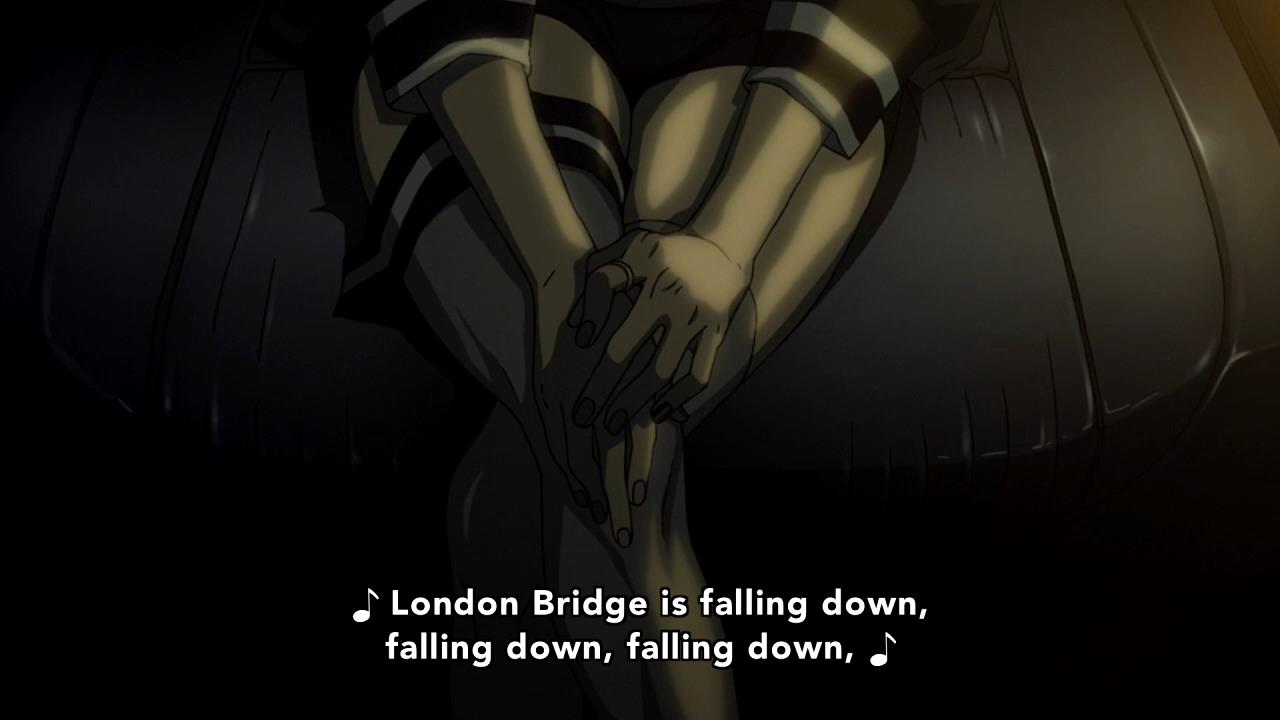
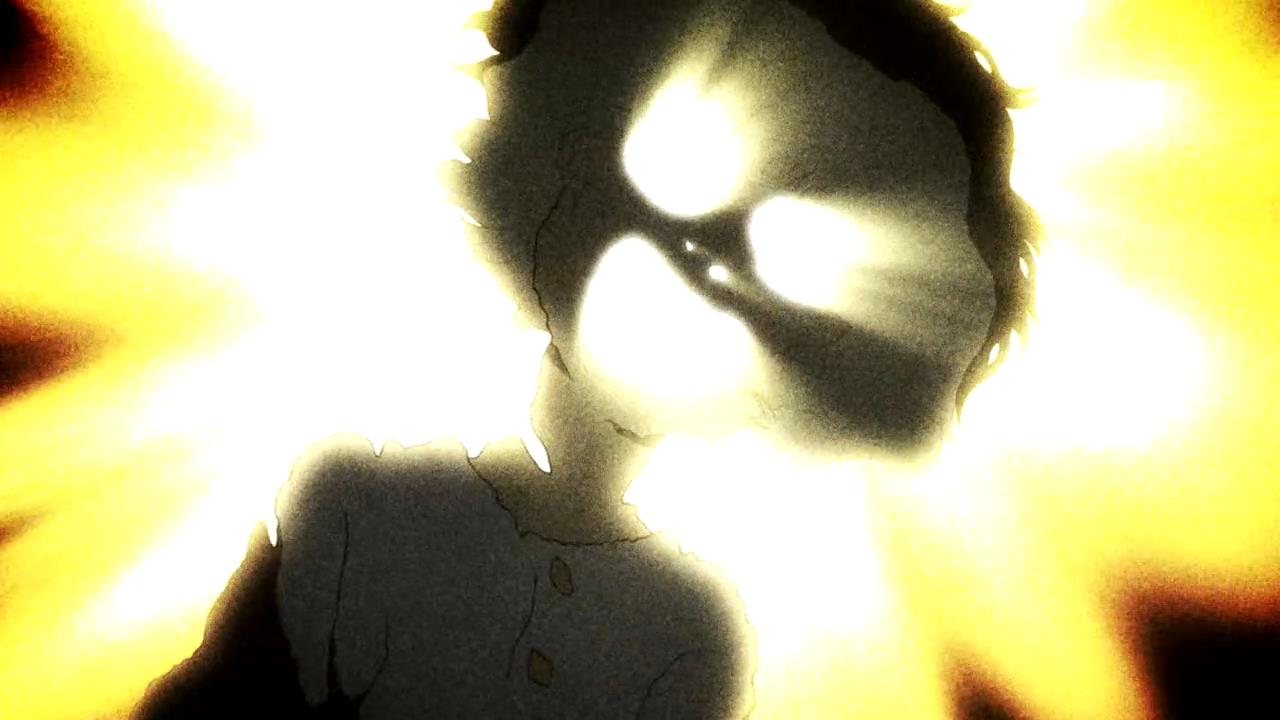
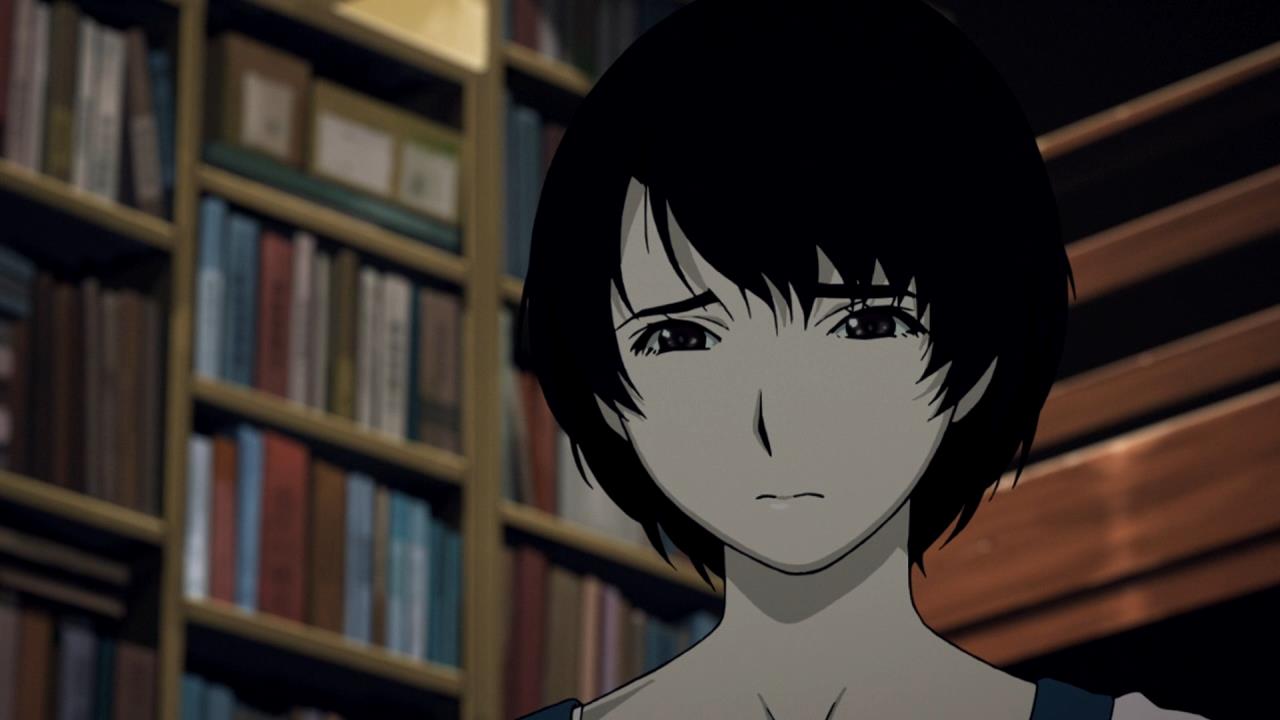
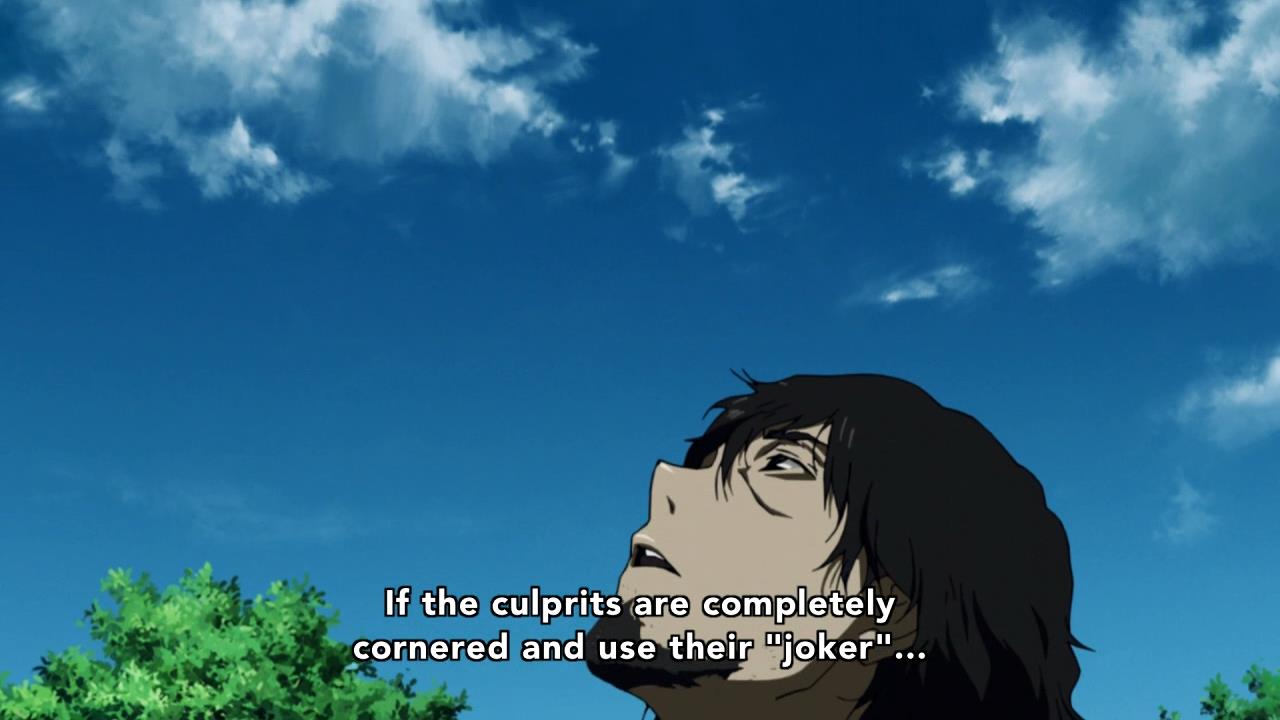
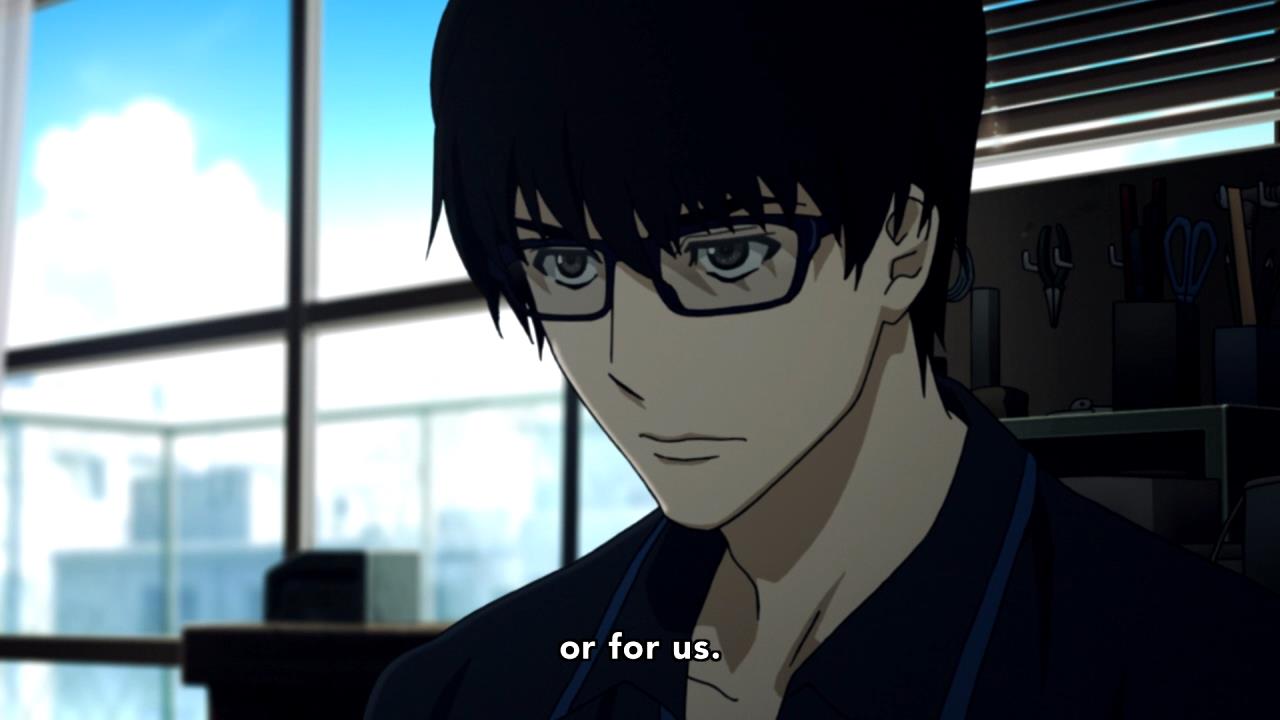
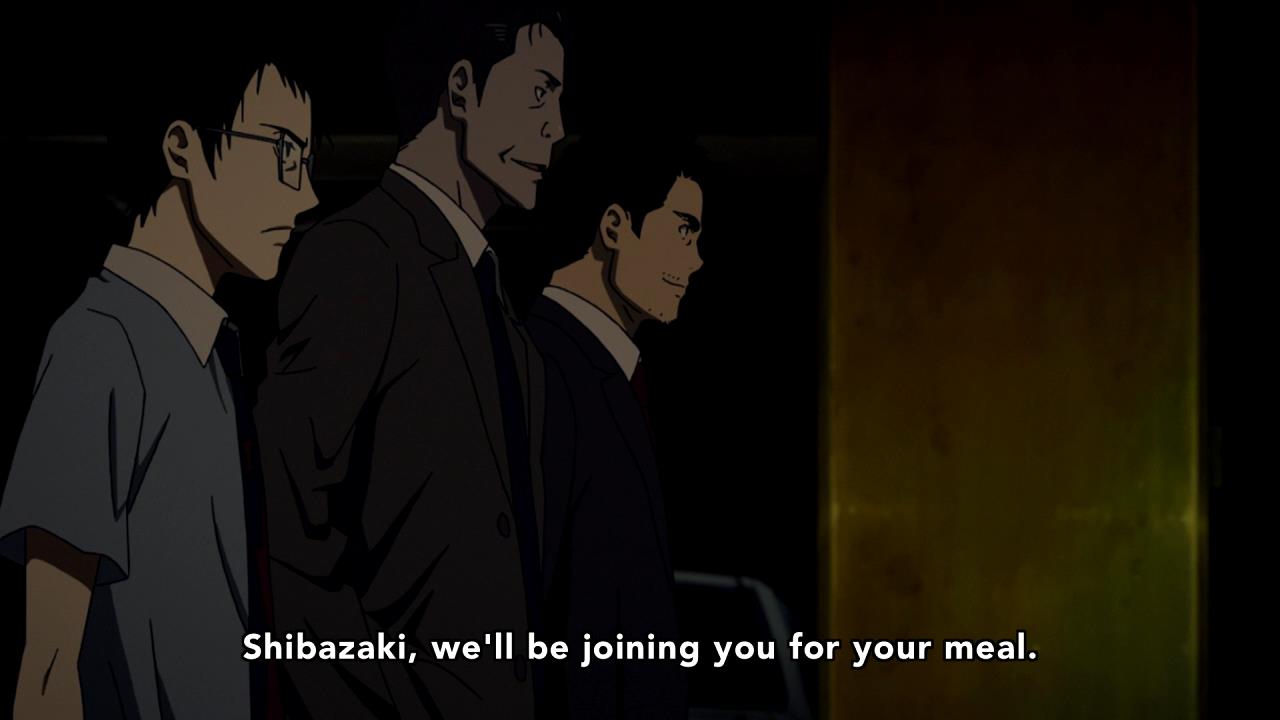
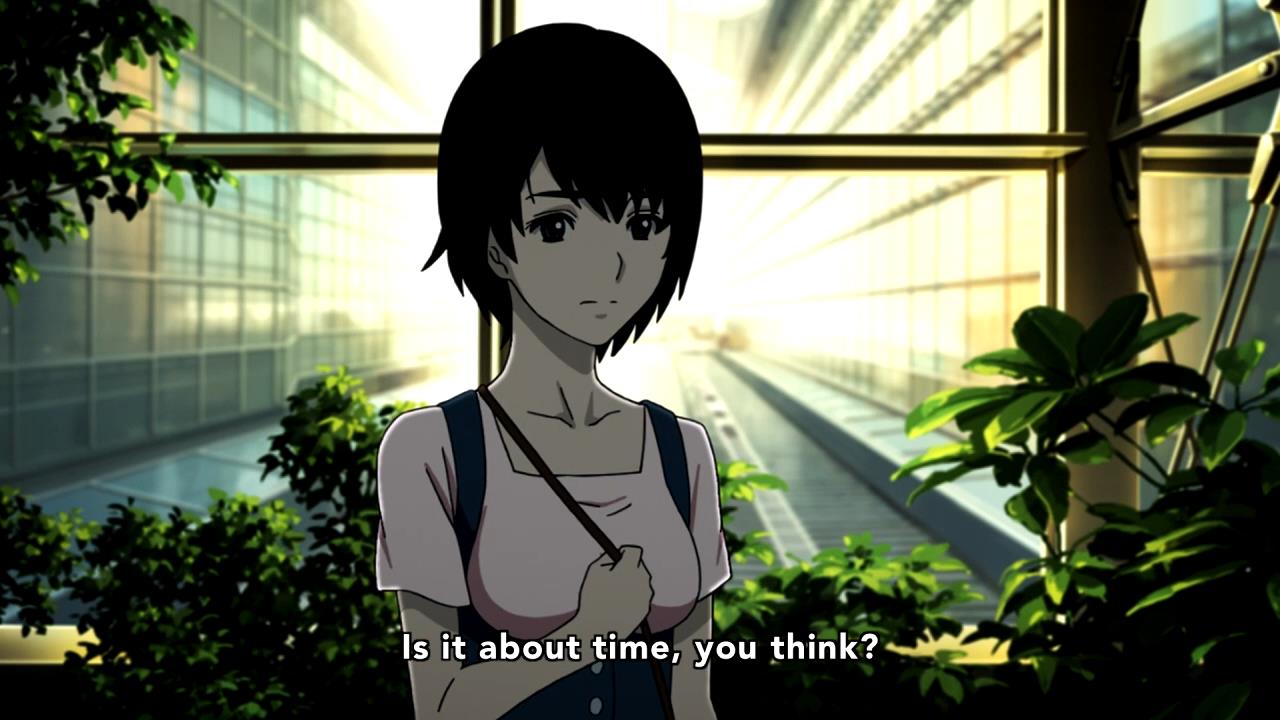
I enjoyed this episode. It was nice to see Lisa getting accepted more by Nine and Twelve, to the point they’re letting her help them.
That Five person seems very…annoying. Her way of behaving to people (for example, those police officers) grated on me a bit. The fact the English in this episode was also more like Engrish also grated 🙁
Yeah, not the biggest fan of Five so far. I like how she serves as a contrast to Lisa, but I don’t like either her melodramatic plot-twisting or the fact that she pushes the show in a plot-focused direction in the first place.
You don’t think Lisa’s outfit is sexy in this episode? It sure has a flattering effect on her upstairs.
The overall theme of “wanting to be useful” for Lisa really adds a lot to her, especially since she fails to be useful as a conventional housewife. Twelve has already foreshadowed the idea that he was going to make a terrorist out of Lisa (showing her the mentos trick, saying in the Sphinx video he wanted a girlfriend who could make bombs, etc), so we’ll see what happens.
It suits her, but I think it fits into a line of outfits that are intentionally more conservative than the image Five’s giving off.
The feathers falling in the OP always reminds me of nuclear ‘winter’. Not sure if that’s what the creators intended or even what the aftermath of an a-bomb looks like, but that’s what I think of whenever I see it.
Yeah, that’s gotta be intentional. “Snow covers everything,” even the fact that they steal their weapon during a snow storm. I’m actually kind of hoping everything goes terribly in this story, that seems to be what the story is pointing towards.
This was a surprisingly cheerful episode despite the basic summary being trying to not get everybody killed by bombs. Even if they can’t be of value to the system, being of value to themselves and other people is just as good (if not better).
Whenever a Japanese voice actor speaks Engrish, a puppy dies…
Engrish whyyy…
I’m becoming very worried about this series. Prior to the introduction of Five the show was very grounded – I won’t call it realistic exactly, but it had an air of realism. Now I keep having to wonder “why the heck are the FBI agents tolerating her playing this sort of game rather than just apprehending the suspects”.
The show wasn’t sold to me on the premise that massive national bureaucracies would willingly submit themselves to teenagers, and I don’t like that I’m being forced to accept it now.
I think the show still has the same “air” of realism matched with a very unreal narrative, but I definitely agree that she is stretching how far they can take that. My main problem is that they’re just drawing too much focus now – them not being realistic isn’t really a problem if the plot isn’t the focus, but if it is, then we have issues.
I had noticed this anime since it was first aired but didn’t watch it yet. Maybe save the best for last?
But why the Japanese like to make anime about System vs. Human? Recently, there are a lot of those. For example: Madoka, Psycho Pass,… and now is this one. I also watched an old anime named “Terra e…” which has that theme too. Do the Japanese find their society too oppressive that they feel the need to make anime about that theme?
“System vs Human” is a pretty huge theme-umbrella, and shows up in all sorts of fiction. I don’t think anime is more focused on it than any other medium.
Five’s character is not really doing too much for me. I somehow expected a bit more subtlety and discretion for the main ‘antagonist’. Nine and Twelve are child geniuses, yes, no doubt manufactured in that place were they’ve been portrayed in their childhood with Five, but somehow, there is a certain brittleness to them that makes them more human, more believable.
I hope Watanabe doesn’t let me down and we get to see m,ore of Five beyond the ‘pyscho genius’ archetype.
Yeah, I’d like to see more of her as a person as well. Which I’m guessing we will, given how cryptic they’re still being about her and Nine’s connection.
Thematically, is an interesting series to watch, to think about the composition, symbolism… Is what you expect from a seasoned director like Watanabe in partnership with a team of high-level
collaborators. But is it enough? This is a series that ought to be about terrorism, its impacts and implications in the japanese population, according to the statement of intents from Watanabe himself. In this regards, Zankyou until now is bad.
I can’t accept that game of chess.
Please do not let me down.
Is it? Zankyou is approaching “terrorism” from the point of view of disenfranchised individuals living in a state that only recognizes them as valid actors if they directly threaten the establishment. It’s contrasting that political idea against classic messages of youth disenfranchisement, and by doing so humanizing the former and elevating the latter. It’s defining modern society as a system that denies purpose or respect to the individual, and through doing so encourages a violent reaction. Personally, I think it’s discussing terrorism in a very compelling way – there are many elements of modern terrorism that are far more intractable than what Zankyou’s discussing, but I think Zankyou is directly addressing real issues, and drawing inferences that are very relevant to the modern world.
Pingback: Summer 2014 – Week 7 in Review | Wrong Every Time